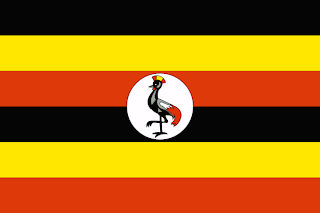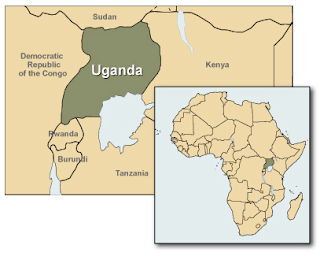
If you are anything like us, you might not know a whole lot about Uganda. We certainly didn't much before we found out it would be our new home while serving in the Peace Corps. So, over the last few weeks we have learned lots about this beautiful country. The Peace Corps Uganda welcome book has been very helpful in giving us some snapshots of our future home. Here are some of the basics and interesting things we've learned about the "Pearl of Africa" so far:
- Uganda is located in East Africa. It spans the equator and is bordered on the west by Congo, on the north by the Sudan, on the east by Kenya, and on the south by Tanzania and Rwanda. Lake Victoria forms part of the southern border.
- The country of Uganda is about the same size as the UK.
- People living in Uganda speak around 50 distinct languages, divided into three major linguistic families. While Swahili and English (inherited from the colonial period) are the official languages, we will likely be learning another language spoken in the rural village in which we will be serving.
- Peace Corps volunteers began coming to Uganda in 1964, and have continued, on and off, since then.
- Currently, there two types of Peace Corps programs operating in Uganda: Education, and Community Health & Economic Development.
- Uganda is one of the countries most severely affected by the HIV/AIDS pandemic, yet it is also a tremendous success story, as infections rates have reduced by 50% over the last 10 years. (The current adult infection rate is around 10%)
- "In the 20th century, Uganda went from being perceived internationally as an Eden incarnate — Britain’s “Pearl of Africa” — to being considered the antithesis of Eden, largely because of the extreme actions of post-independence leaders Idi Amin and Milton Obote."
- Uganda peacefully achieved independence from Great Britain in 1962.
- Until recently, the Ugandan government followed a single or no-party parliamentary system. However, now there is a parliament representing various parties.
- Uganda has frequently been considered an economic success story by the World Bank and the International Monetary Fund, due to their economic reforms that begun in 1986.
- Education is highly valued in Uganda, as seen by the government's commitment to universal primary (and recently, post-primary) education.
- Uganda has an equatorial climate that is moderated by altitude. Average annual rainfall varies from more than 84 inches around Lake Victoria to about 20 inches in the northeast. Vegetation is heaviest in the south, thinning out to savanna and dry plains in the northeast.
